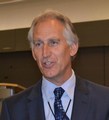A 3-YEAR STRATEGY FOR ENSURING CONTINUITY OF THE PARTNERSHIP NETWORK: “We have started to engage government with training and will continue through 2024. It is full speed ahead,” stated Ted van der Gulik in his President’s Perspective (Annual Report 2023, Partnership for Water Sustainability in BC)

“A challenge confronting our society is widespread organizational amnesia. The baby boomers have more or less gone out the door. And with them has gone so much oral history. Knowledge and experience are not being passed on. Organizational amnesia is the consequence. It is a race against time to pass on knowledge and experience. It feels like the gap caused by loss of understanding is widening. When those coming into organizations do not know what they do not know, loss of understanding of the WHAT, WHY and HOW is a cause of concern in managing expectations,” stated Ted van der Gulik.










